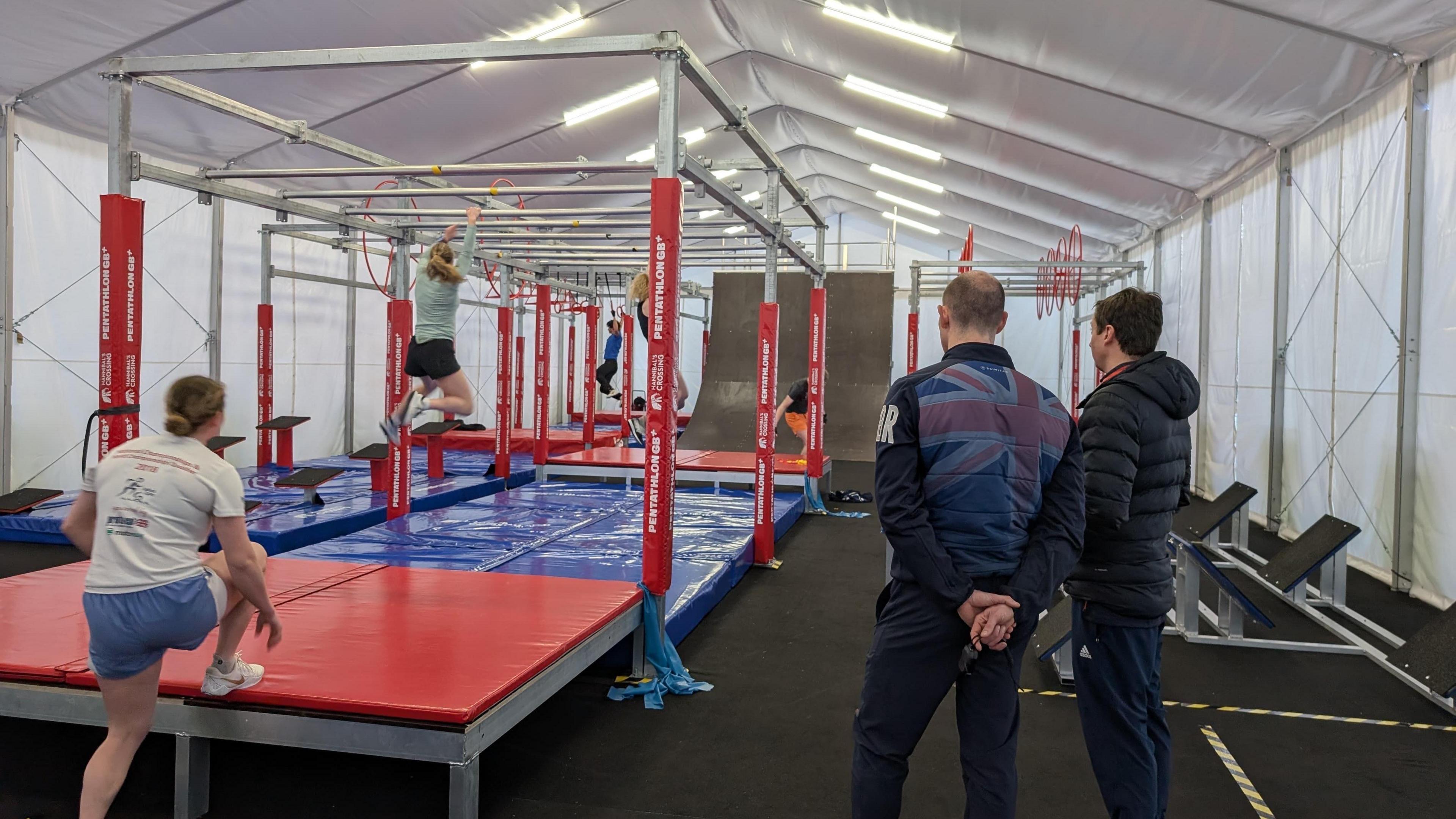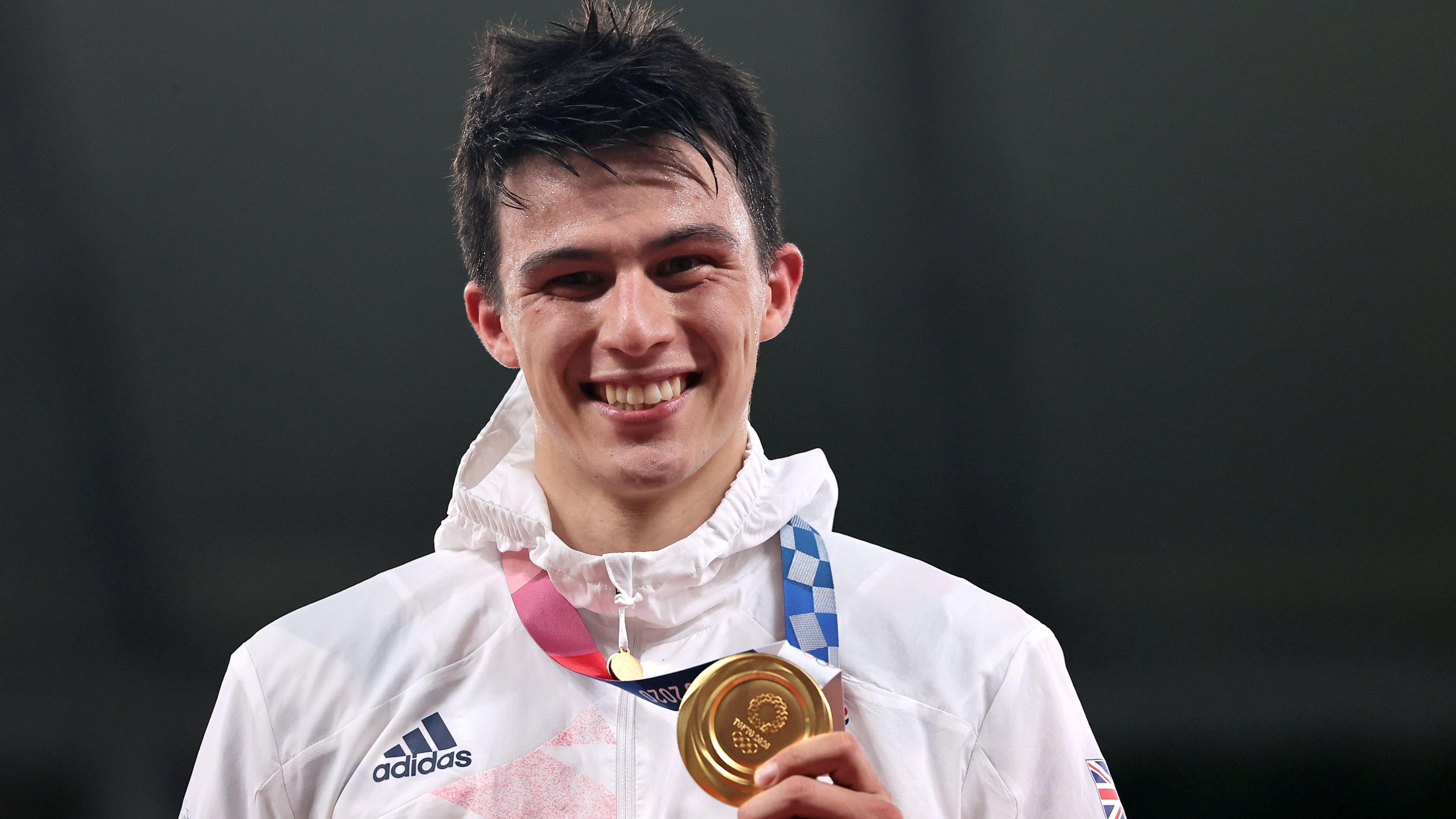Pentathletes must 'crack on' with obstacle event
How the modern pentathlon obstacle course event works
- Published
Joe Choong might be a former Olympic gold medallist in modern pentathlon but like all other athletes in the sport, he is a complete novice when it comes to the new 'Ninja Warrior' style obstacle racing recently introduced as a new discipline.
For the past six weeks Choong, who won gold at the Tokyo 2020 Games, has been getting to grips with the obstacle assault course that has replaced showjumping as one of the five events.
It features an 80m course which athletes have to get through as quickly as possible, packed with eight obstacles such as monkey bars, high rings and a wall run.
"I was against the change; if I could choose I still wouldn't choose this but there's nothing we can do," Choong told BBC Radio Somerset.
"I fought as hard as I could to stop it - so did a lot of other athletes - and now we have to accept it or move on."
Fencing, swimming, and a combined running and shooting event make up the four other disciplines that remain in modern pentathlon.
Choong was one of the most vocal athletes against the overhaul to the sport's traditional format, brought in after the equestrian element came under spotlight when a German coach was thrown out of the Tokyo Olympics for appearing to punch a horse.
However, after taking a break following the Paris Olympics - where he finished ninth - the 29-year-old is back in Bath at the Team GB modern pentathlon base, giving the obstacle course a go.
"It just depends what part of your career you're in, whether you feel it's a good time to move on or you give the new event a try," Choong said.
"It's definitely something I'm going to get stuck in with and crack on with but I'm not sure relishing is quite the right word."

Athletes practise the new 'obstacle course' at Team GB's base in Bath
Choong stresses the new discipline is "fun".
Six of the eight obstacles will remain the same every competition, while the other two will be a variant of six more, meaning athletes have to train with all 12.
"I find it a little bit strange compared to the other more historic sports because you can come into this and be relatively competent quickly, so that learning curve seems like a bit of a different trajectory compared to the other sports," he said.
Modern pentathletes tend to be well-rounded, versatile athletes but the new discipline is very "upper body focused" Choong says, and requires a different strength and conditioning to the horse riding it has replaced.
Much of Choong's six weeks of training so far has been spent in the gym, or with the physios, rather than on the course itself.
"The hard part is training to improve because you've got to be swinging on your arms, doing pull-ups for essentially an hour," Choong said.
"The hardest part for me is doing that conditioning, getting my body ready so that I can actually work on improving."
Obstacle racing gets modern pentathlon approval
- Published12 November 2022
'We've got a lot to learn'
Olivia Green, who is also on the Great Britain senior performance squad, was similarly against the event change, but has come to accept it is here to stay.
"If I've wanted to do pentathlon, this is the reality I've needed to accept and actually embrace and enjoy," she said.
"I'm feeling a lot better about it now than I was."
The event, though, is still very much in its infancy and Green believes the only way athletes will improve at it is when competitions start in earnest this season.
The World Cup series begins in April, with the European Championships in June and World Championships in August.
"We've had some national rankings [competitions] and that's really helped," Green said.
"Those will really help just get used to competing in the sport. We've still got a long way to go and a lot to learn.
"Hopefully by August time I'm going to be a lot more prepared than I am now."

Joe Choong became the first British man to win individual Olympic gold in modern pentathlon in Tokyo
The format of modern pentathlon has changed in the sport's recent history as the authorities try to push it more into the public mainstream, beyond just the Olympic Games.
It first appeared at the 1912 with the five events - swimming, fencing, show jumping, shooting and running - modelled on the skills required by a soldier.
While the obstacle course section might bring in a new audience, Choong is unsure whether this is the golden change the sport needs.
"Every Olympic cycle has had some sort of change in one way or another with the promise of it bringing pentathlon to the masses," Choong said.
"Is this the change that's going to do it? I don't know, I'd love for pentathlon to be a mainstream sport but I'm not sure."
As for whether he will be sticking with it through to the 2028 Olympics in Los Angeles, Choong is also keeping his options open.
"It's definitely in my mind that's the next thing, that's on the horizon," he said.
"But for me my focus is on a couple of other personal bits right now that I want to have done and have sorted in my life."